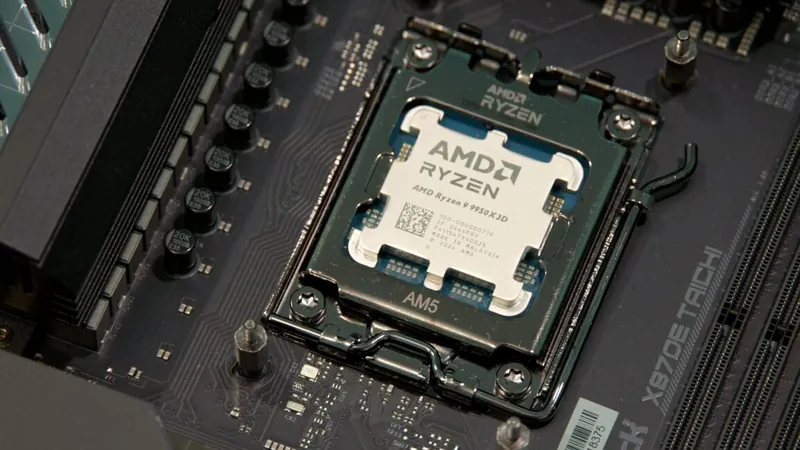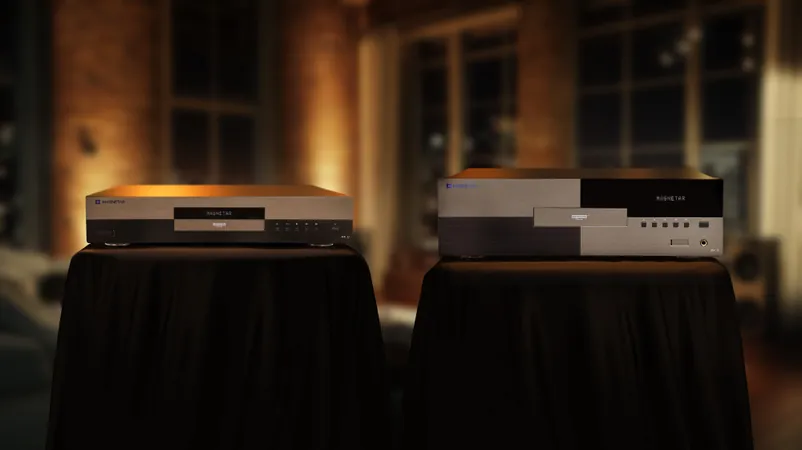
AMD Struggles with Burnt-Out CPUs: Is Your Motherboard to Blame?
2025-08-25
Author: Michael
AMD's CPU Troubles: A Cautionary Tale for Gamers
In the thrilling world of PC gaming, AMD's X3D-series Ryzen chips have garnered immense popularity, especially among gamers seeking that competitive edge. These processors shine thanks to their extra 64MB of L3 cache memory, tailored to enhance gaming performance. However, this additional power isn't without its pitfalls.
Shortly after their launch this year, early adopters reported a range of troubling issues—from complete system failures to alarming physical scorches and burnouts. The 9800X3D CPU model, in particular, has drawn scrutiny, especially among users of ASRock motherboards. One eye-opening Reddit thread has documented over 157 failure incidents linked to this combination.
Who's at Fault? AMD Points the Finger at Motherboard Makers
In a revealing interview with Quasar Zone, AMD executives David McAfee and Travis Kirsch acknowledged these severe issues and indicated that motherboard manufacturers could be the main offenders. Some of these companies have a history of shipping their products with elevated power settings to extract more performance from both AMD and Intel chips. While this can yield a slight boost in performance, it often causes serious problems, particularly with high-end CPUs.
A Concerning Pattern: Echoes of the Past
This incident isn't the first time AMD has faced such challenges. Earlier in 2023, the AM5 socket saga unfolded as Ryzen 7000-series X3D chips reportedly started developing dangerous bulges, risking permanent damage to both the CPUs and their sockets. AMD placed the blame on incorrect voltage settings from certain motherboards and responded with BIOS updates to enforce stricter voltage regulations.
Intel's recent history offers a cautionary tale as well. The chip giant spent months troubleshooting issues with its 13th and 14th generation Core CPUs, which were fraught with performance degradation. Similar to AMD's situation, Intel identified motherboard manufacturers as significant contributors to the issues, prompting them to extend warranties to cover the damages.
Keeping Your System Safe: Essential Advice from AMD
As a precaution, McAfee and Kirsch urge all users to regularly update their motherboard BIOS to ensure they are using the latest default settings. This practice not only helps address existing issues but also supports new processor integrations, enhances memory compatibility, and patches security vulnerabilities.
The Complexity of Compatibility: A Unique AMD Challenge
Testing and diagnosing problems can be a daunting challenge for AMD. Its long-lasting chipsets and a variety of CPU sockets mean a multitude of possible system configurations. Particularly with AM4 motherboards, a 2017 X370 model could easily be paired with a cutting-edge Ryzen 5 5500X3D. Even in the current AM5 ecosystem, users may experiment by slotting new Ryzen X3D processors into motherboards that are several years old—something largely unmatched in Intel’s product lines.
As gaming technology continues to evolve, staying informed and proactive can mean the difference between an exhilarating experience and a costly headache.









 Brasil (PT)
Brasil (PT)
 Canada (EN)
Canada (EN)
 Chile (ES)
Chile (ES)
 Česko (CS)
Česko (CS)
 대한민국 (KO)
대한민국 (KO)
 España (ES)
España (ES)
 France (FR)
France (FR)
 Hong Kong (EN)
Hong Kong (EN)
 Italia (IT)
Italia (IT)
 日本 (JA)
日本 (JA)
 Magyarország (HU)
Magyarország (HU)
 Norge (NO)
Norge (NO)
 Polska (PL)
Polska (PL)
 Schweiz (DE)
Schweiz (DE)
 Singapore (EN)
Singapore (EN)
 Sverige (SV)
Sverige (SV)
 Suomi (FI)
Suomi (FI)
 Türkiye (TR)
Türkiye (TR)
 الإمارات العربية المتحدة (AR)
الإمارات العربية المتحدة (AR)